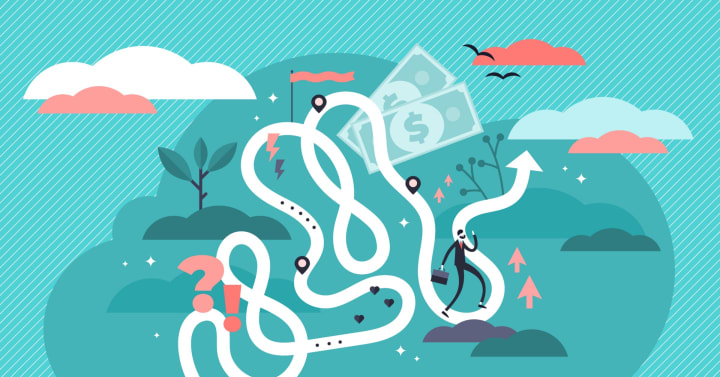Science Says Reading Can Improve Your Health
It's not about gloating about how many books you read this year; it's for the health benefits.

"Let us read, and let us dance; these two amusements will never do any harm to the world."
― Voltaire
Reading is often elevated as a way for people to defend their knowledge, sound smart, or seem like important people. There are a lot of articles out there about how reading one million books a year will change your life. I'm exaggerating here, but you've also seen those articles.
It might sound boastful, but there is a lot of validity to how reading can improve your life. It doesn't necessarily have to be reading textbooks and self-help books, either.
I'm very motivated to research and share why reading can improve your health. It sounds far-fetched, but at heart, I'm a writer. Since I am a writer, I am constantly reading.
Reading has always been part of my life, but in the last year, I also set out on a journey to improve my health by eating more nutrient-rich foods, losing a little weight, and practicing yoga. I was tremendously excited when I realized that reading could also factor in me reaching my health goals.
Reading can reduce your stress levels.

I read, largely, for entertainment. I love sci-fi and fantasy. Essentially, I'm just reading for fun.
But beyond personal enrichment, reading doesn't get the spotlight it deserves for its positive health effects. A few years ago, the University of Sussex did a study on the exact ways reading can help reduce stress. You might think you don't have time to read, but reading is actually one of the most efficient ways to reduce stress.
Their research shows that reading is quite possibly the best way to relax. It only takes six minutes of reading a book, article, newspaper, or poetry to reduce your stress levels by more than 2/3rds.
Not only does it not take long to reap the stress-relief benefits of reading, but it's also the fastest way to alleviate stress. Their findings revealed that reading is better and faster at alleviating stress than going for a walk, listening to music, or having a cup of soothing tea. Those are also good methods for stress relief, but they won't work on you quite as fast as reading does.
The psychologists who were part of the study said this is because the "human mind has to concentrate on reading and the distraction eases the tensions in muscles and the heart."
When you think about it practically, it does make sense. It's easy to keep worrying and stressing while you're listening to a song, stretching your legs, or sipping your tea. Reading forces you to focus on something else. It interrupts those patterns of toxic, stressful thoughts.
This survey was handled a little more anecdotally rather than in a lab setting, but the University of Liverpool surveyed 4,164 adults about reading. They found several interesting differences between people who read regularly and those who do not. People who read regularly reported being less stressed, less depressed, possessing higher levels of self-esteem, and a greater ability to cope with challenges. This might sound a little too good to be true, but this isn't the only study that showed reading might do even more than stress relief.
Reading can protect your memory.
"A reader lives a thousand lives before he dies, said Jojen. The man who never reads lives only one."
― George R.R. Martin, A Dance with Dragons
This study might come off as sounding a little grim, but I'm fascinated by the fact that reading can support you at every stage of your life. Whether you're in your 20s and desperately need stress relief or you're in your 60s and approaching retirement, there's a good reason to read.
A study published by the American Academy of Neurology suggests that brain-stimulating activities, including reading, help your brain as you age.
This study was focused on specific test subjects and tracked them for an entire six years. The researchers followed up with the participants consistently and recorded changes. Here's how the study was conducted.
"For the study, 294 people were given tests that measured memory and thinking every year for about six years before their deaths at an average age of 89. They also answered a questionnaire about whether they read books, wrote and participated in other mentally stimulating activities during childhood, adolescence, middle age and at their current age."
After participants passed away, their brains were examined during their autopsies. They looked for physical signs of dementia, such as lesions, brain plaques, and tangles.
I know, grim stuff - but these were people who freely volunteered for the study and considering most of them made it to nearly 90, it's not too hard to imagine they led happy lives.
Ultimately, the study found that the rate of decline was reduced by a formidable 32% in people with frequent mental activity. Reading has some significant benefits for your overall brain health as you live your life. It's pretty amazing to think that the mechanical act of reading and simply enjoying a novel of your favorite genre can help your health long term.
Reading can prepare you for the twists and turns life inevitably has.

"The more that you read, the more things you will know. The more that you learn, the more places you'll go."
― Dr. Seuss, I Can Read With My Eyes Shut!
I know, I know —how in the world am I going to scientifically prove this one?
Maja Djikic, a psychologist at the University of Toronto, specifically looks at how reading fiction can help us. Fiction readers tend to be very flexible and creative. You might think that creativity is one of those soft skills that people don't really need, but flexibility is important.
Even when things are going well in your life, it's just the nature of existing that you're going to hit bumps in the road. Something might get more stressful at work, something might happen in your family, you might move to a new place. In those situations, we need to be able to find creative solutions to problems and have the flexibility to adapt to whatever new circumstances are thrown at us.
"When we read fiction, we practice keeping our minds open because we can afford uncertainty," Dr. Djikic said in an interview with Mental Floss.
If you want to dig into the process behind her study more, her findings suggested that "reading fictional literature could lead to better procedures of processing information generally, including those of creativity."
There's the good news; it can be romance, sci-fi, fantasy, mystery, whatever genre you want. You can indulge in your guilty pleasure genre and still reap the benefits of reading.
As a creative person myself, I do feel like reading more makes me more motivated to tackle my creative hobbies. However, creativity and flexibility are important for everyone.
About the Creator
Leigh Fisher
I'm a writer, bookworm, sci-fi space cadet, and coffee+tea fanatic living in Brooklyn. I have an MS in Integrated Design & Media (go figure) and I'm working on my MFA in Fiction at NYU. I share poetry on Instagram as @SleeplessAuthoress.






Comments
There are no comments for this story
Be the first to respond and start the conversation.